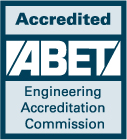Tulane's Biomedical Engineering Program (established in 1977) has been continuously accredited since 1981 by the Engineering Accreditation Commission of ABET.
Our undergraduate program provides students with the breadth required for participation in the interdisciplinary field of biomedical engineering and the depth required by engineers to advance the practice in our discipline. Our objective is to prepare graduates who are able to successfully pursue:
- advanced studies leading to research or professional practice in biomedical engineering
- advanced studies leading to research or professional practice in the health and medical sciences
- practice in biomedical engineering industries or related technical and professional fields
By the time of graduation, we expect our students to demonstrate that they have attained the following outcomes:
- an ability to identify, formulate, and solve complex engineering problems by applying principles of engineering, science, and mathematics
- an ability to apply engineering design to produce solutions that meet specified needs with consideration of public health, safety, and welfare, as well as global, cultural, social, environmental, and economic factors
- an ability to communicate effectively with a range of audiences
- an ability to recognize ethical and professional responsibilities in engineering situations and make informed judgments, which must consider the impact of engineering solutions in global, economic, environmental and societal contexts
- an ability to function effectively on a team whose members together provide leadership, create a collaborative and inclusive environment, establish goals, plan tasks, and meet objectives
- an ability to develop and conduct appropriate experimentation, analyze and interpret data, and use engineering judgment to draw conclusions
- an ability to acquire and apply new knowledge as needed, using appropriate learning strategies.
Additionally, our program prepares our graduates with experience in:
(a) Applying principles of engineering, biology, human physiology, chemistry, calculus-based physics, mathematics (through differential equations) and statistics;(b) Solving bio/biomedical engineering problems, including those associated with the interaction between living and non-living systems;
(c) Analyzing, modeling, designing, and realizing bio/biomedical engineering devices, systems, components, or processes; and
(d) Making measurements on and interpreting data from living systems.
Undergraduate Enrollment (Sophomores-Seniors):
2022-2023: 76
2021-2022: 85
2020-2021: 102
2019-20: 124
BSE Degrees Earned:
2022-2023: 28
2021-2022: 32
2020-2021: 39

